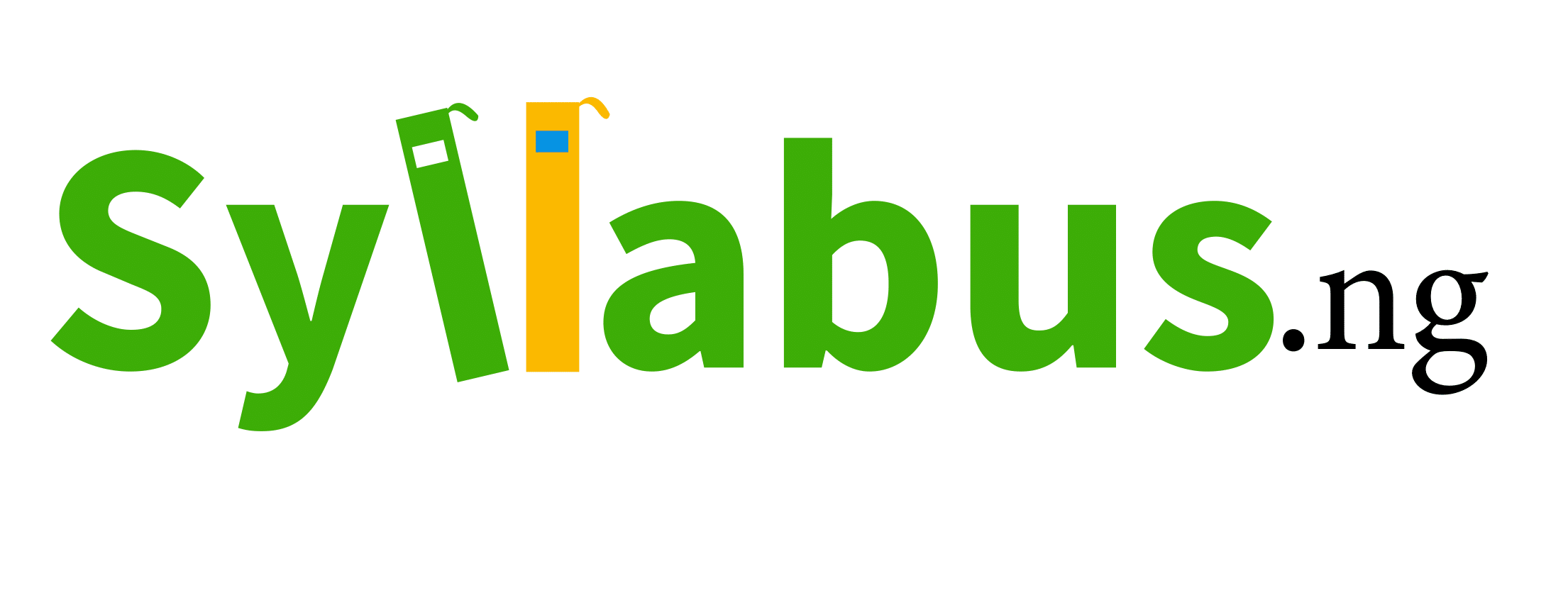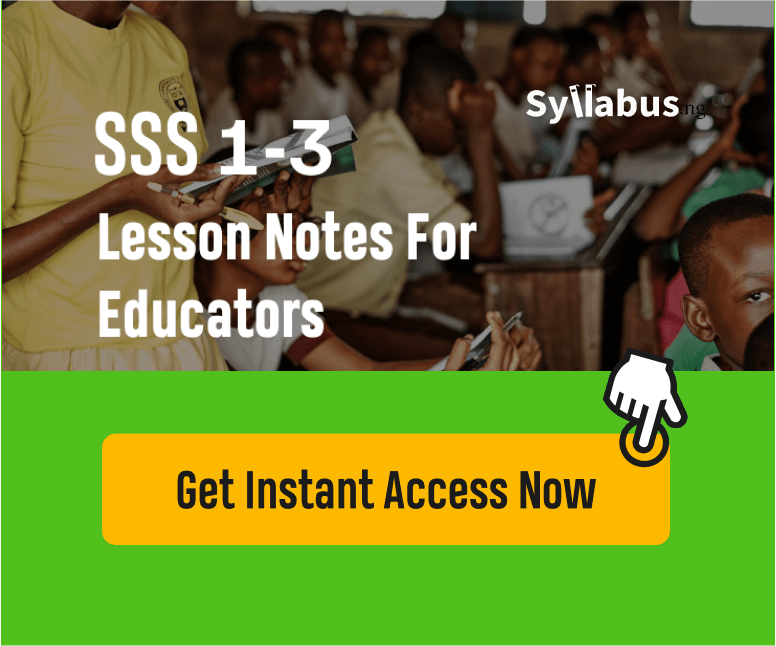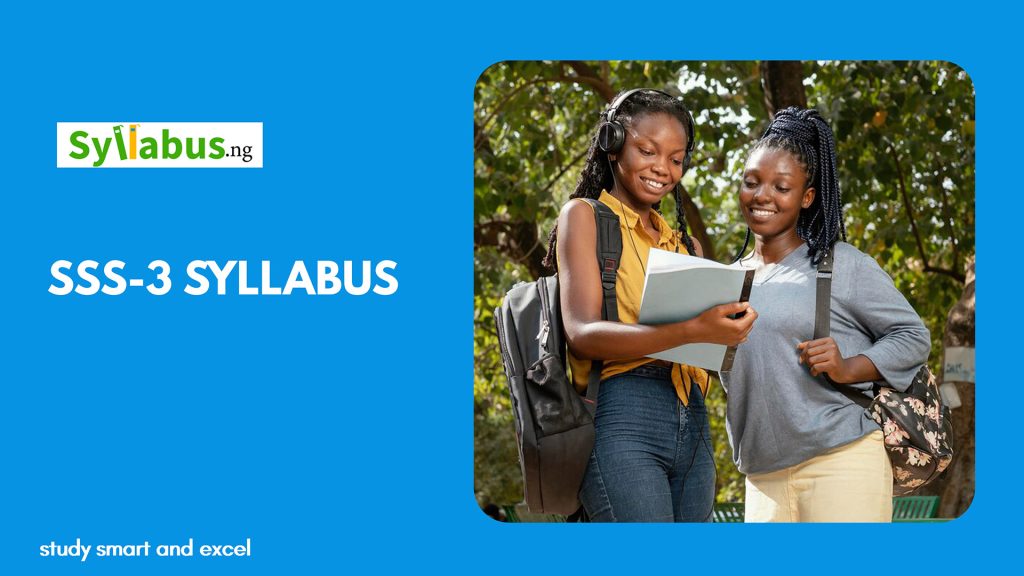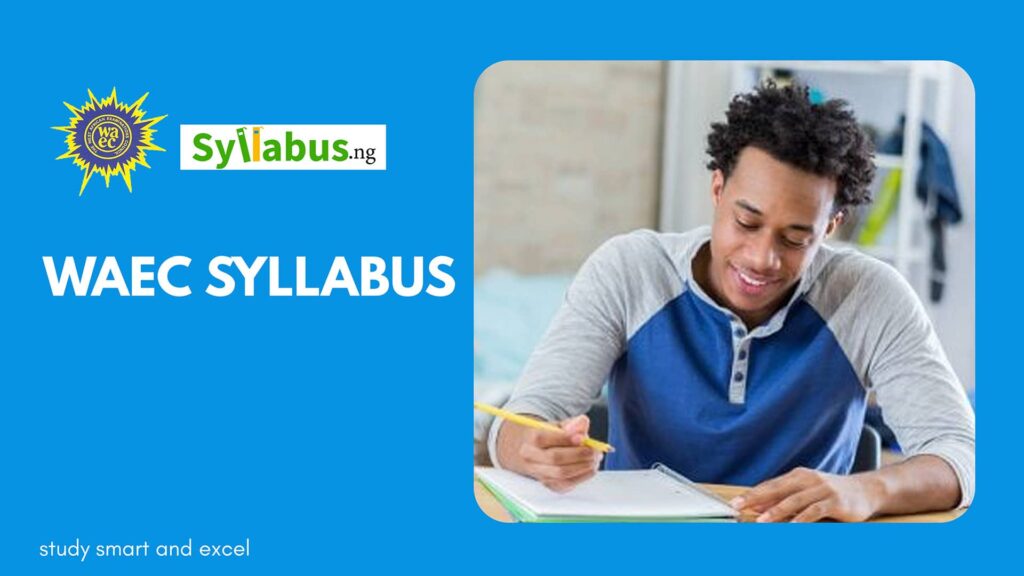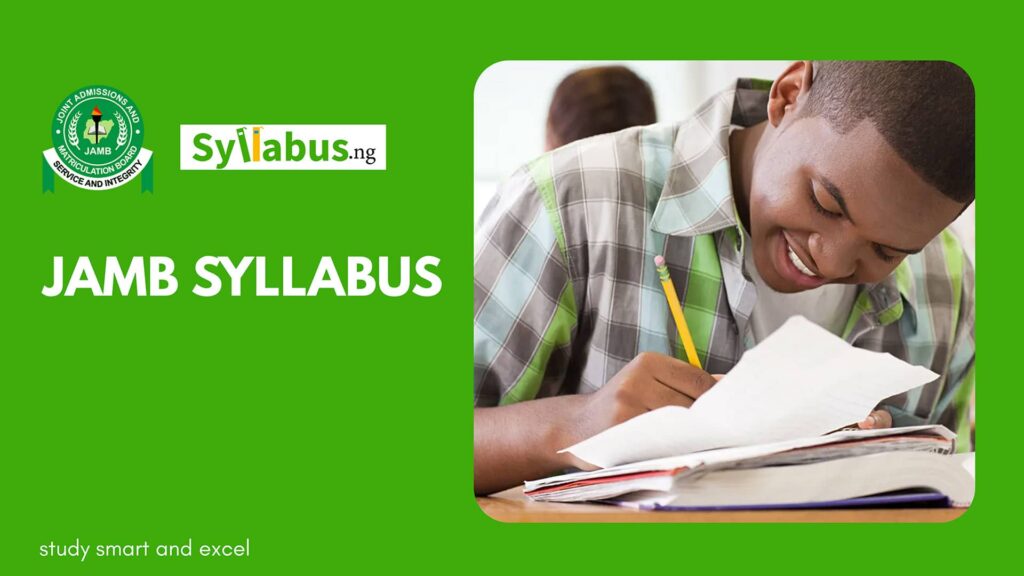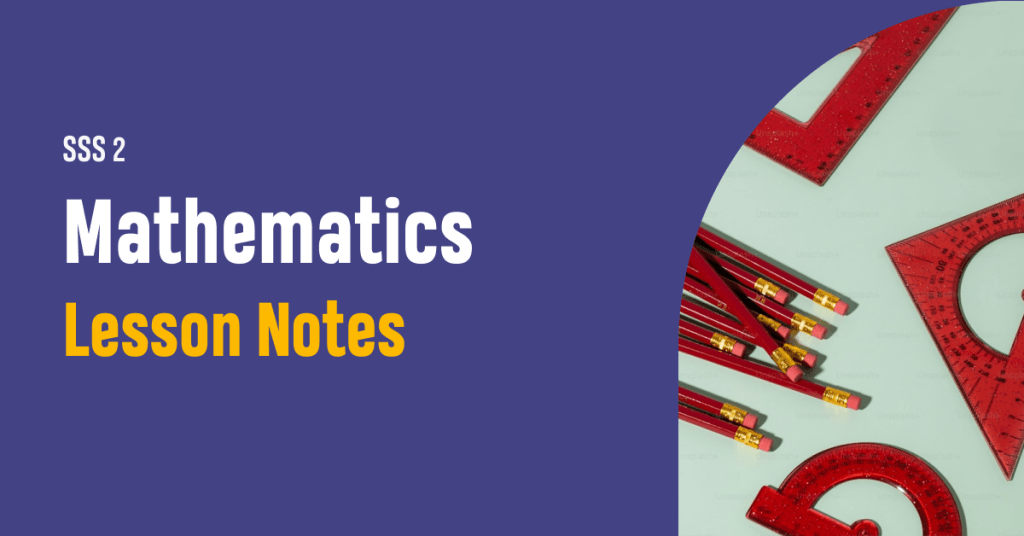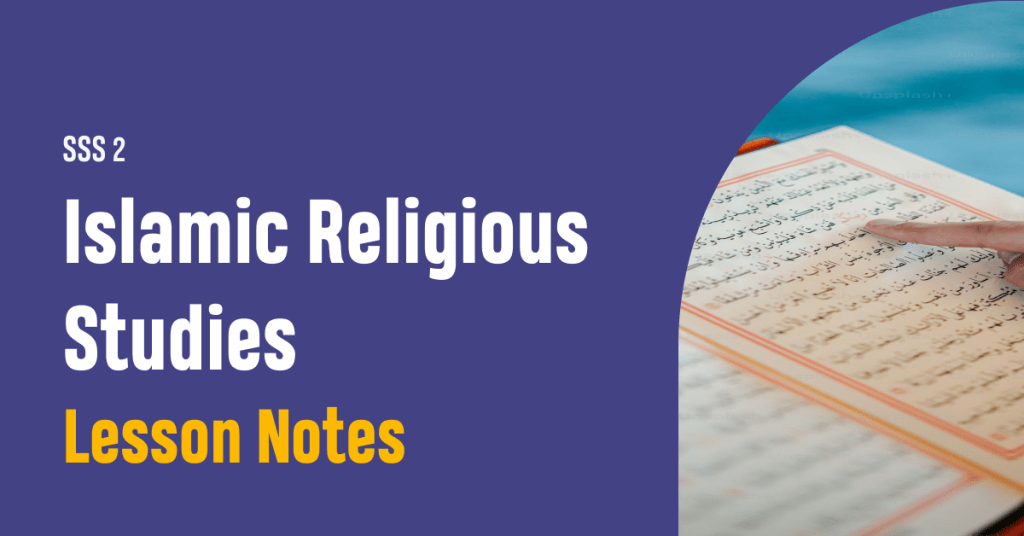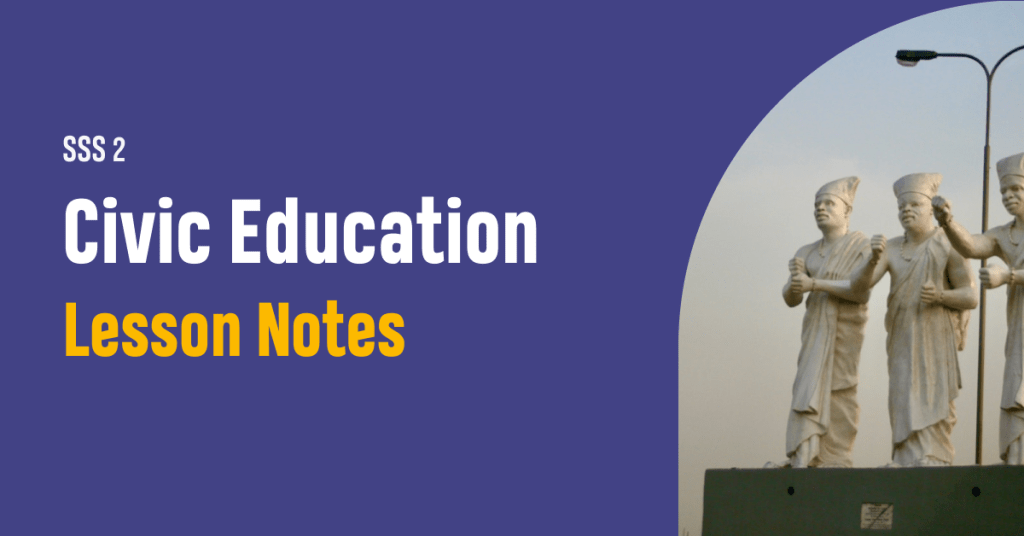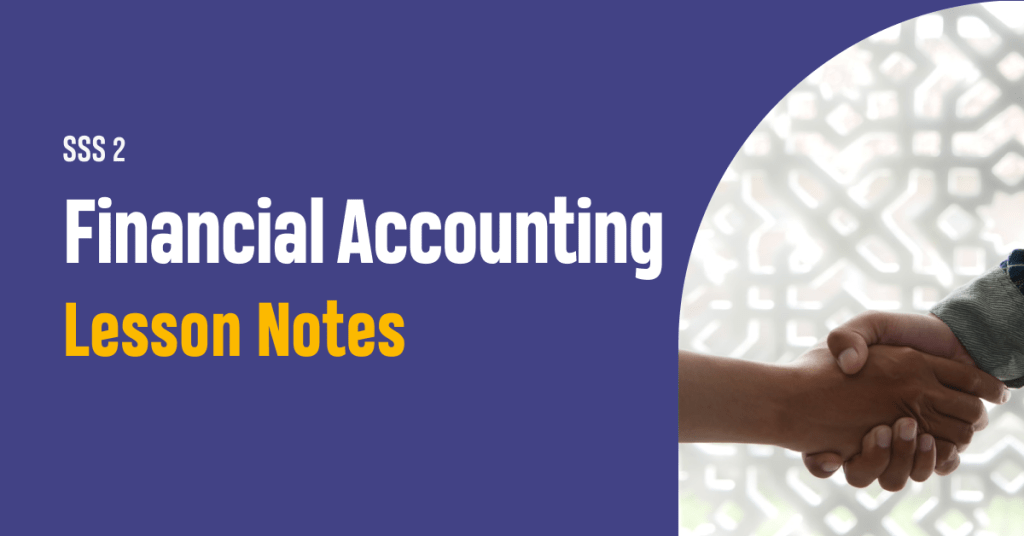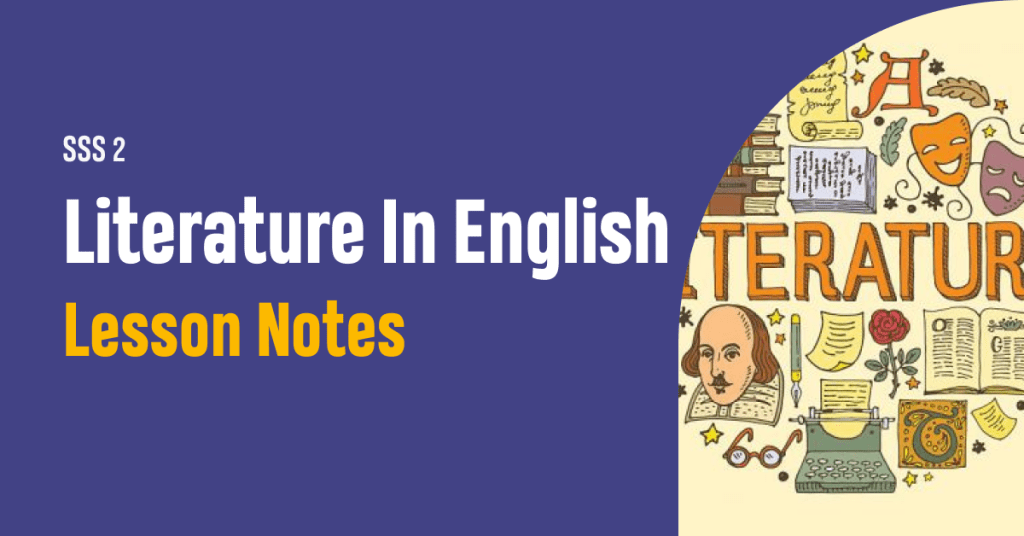SS2 English Language Scheme of Work
Download the Senior Secondary School 2 (SS2) Unified Scheme of Work for English Language to serve as a guide for educators

Home » SSS2 Scheme of Work » SSS2 English Studies Scheme of Work
Home » SSS2 Scheme of Work » SSS2 English Studies Scheme of WorkAbout SS2 English Studies Scheme of Work
In Senior Secondary School 2 (SS2), English Studies offers students a comprehensive look into the English language, encompassing literature, grammar, and writing. The Lagos state unified scheme of work for English studies aims to sharpen students’ critical thinking, analytical abilities, and mastery of both written and oral English. Students study a variety of texts, from classic to modern literature, and are encouraged to express themselves through creative and expository writing.
Additionally, the subject emphasizes improving grammar and vocabulary, equipping students for higher academic challenges and effective communication in various settings. By the end of SS2, students will better master English, equipping them for more advanced studies and various communication challenges ahead.
Achievement Standards
SSS2 First Term
At the end of the SSS2 first term, students can;
- Convert adjectives and verbs into nouns;
- Produce consonant and vowel sounds appropriately;
- Write essays and letters on given topics;
- Summarise given passages without mindless lifting;
- Identify different phrases or clauses in given expressions and state their functions;
- Answer questions on given comprehension passages.
SSS2 Second Term
At the end of the SSS2 second term, students can;
- Use punctuation marks correctly;
- Write good reports on different experiments;
- Answer questions on given comprehension passages;
- Identify the main and supporting ideas in given comprehension passages;
- Summarise given passages without mindless lifting;
- Answer questions on the same consonant/vowel sounds, rhyme, and stress.
SSS2 Third Term
At the end of the SSS2 third term, students can;
- Use tenses appropriately in sentences;
- Write speeches for different occasions purposes;
- Develop outlines and write articles for publications in national newspapers on given topics;
- Form new words by using prefixes and suffixes;
- Summarise given passages without mindless lifting;
- Understand and use a wide range of vocabulary.
Assessment Guide
Assessment in SS2 English studies comprises written exams covering grammar and essay writing, coursework like essays and projects, oral presentations, class participation, quizzes, group work, and reading comprehension tests. These methods evaluate comprehension, communication, analytical skills, and collaborative abilities essential for effective English language proficiency.
Grading follows a scale from A to F, with A representing excellent performance, typically scoring around 70% or 80%, and F indicating failure, usually below 50% or 45%.
Download SSS2 English Scheme of Work
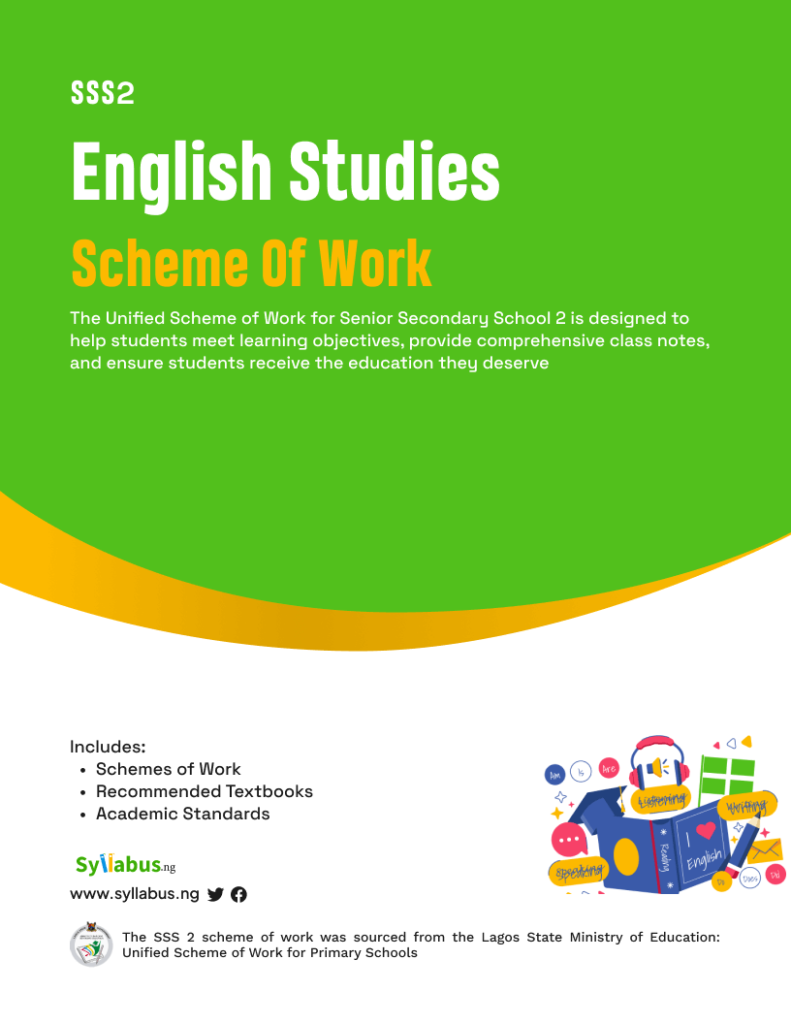
Know what’s expected of you as an educator
Download the Lagos State Unified Scheme of Work for Senior Secondary School Two (SSS2) English
Get SSS2 English Lesson Notes
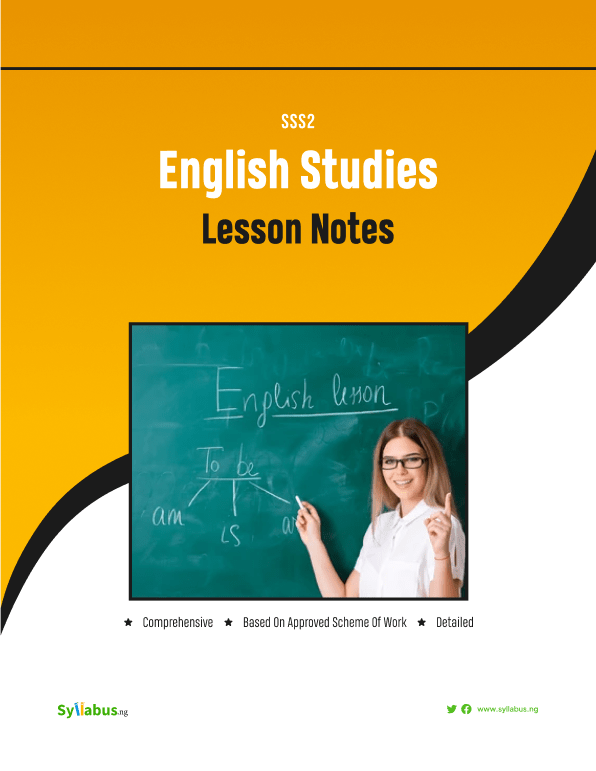
Never bother about writing lesson notes again. Get our well written SSS 2 English lesson notes for (First, Second & Third Term).
Its’s printable, in PDF Format, editable, and easy to use.
SS2 First Term Scheme of Work for English Language
| LAGOS STATE MINISTRY OF EDUCATION UNIFIED SCHEMES OF WORK FOR SENIOR SECONDARY SCHOOLS | ||
| English Scheme of Work for Senior Secondary Schools 2(SSS2) | ||
| CLASS | SS2 | |
| SUBJECT | English Language | |
| TERM | First Term | |
| WEEK | TOPICS | Learning Objectives |
| 1 | – Welcome Test – Revision A) GRAMMAR: NOMINALIZATION OF ADJECTIVES AND VERBS B. ORAL: CONSONANT SOUNDS C. SUMMARY D. WORDS FOR THE WEEK | By the end of the lesson, students should be able to: i. analyze nominalization of adjectives and verbs ii. describe the process of norminalization of adjectives and verbs iii. convert or transform adjectives and verbs into nouns i. classify all the 24 consonant sounds in English into voiced and voiceless consonant sounds ii. contrast consonant sounds with copous examples iii. produce consonant sounds correctly i. explain what summary is ii. outline the features of summary iii. outline the do’s and dont’s of a summary iv. summarize a given passage i. Learners are to be guided to learn the following words: bombastic, dearth, hiatus, implacable, stingy, dour, ebullient, ignominious, impinge, tome |
| 2 | A. ORAL: CONSONANT CLUSTER – Cluster of two consonants – Cluster of three consonants – Cluster of four/five consonants B. VOCABULARY DEVELOPMENT/COMPREHENSION – Words associated with the human body system and functions – A comprehension passage that has numbered gaps including missing words which students must fill in with the appropriate words C. WRITING: EXPOSITORY ESSAY( CONTROLLING HIV/AIDS IN NIGERIA or MANAGING POPULATION EXPLOSION IN NIGERIA) D. WORDS FOR THE WEEK | By the end of the lessons, students should be able to: i. explain what a consonant cluster is ii. identify a consonant cluster or consonant clusters in any given word iii. analyze consonant clusters with regard to their places of occurrence in words i. identify words that are associated with the human body system ii. generate sentences that contain those words iii. emulate the functions of each of the words i. explain what an expository sentence is ii. discuss HIV/AIDS or population explosion iii. discuss how to control HIV/AIDS or how to manage population explosion in Nigeria iv. write an expository essay on: How To Control HIV/AIDS in Nigeria OR How To Manage Population i. Learners are to be guided to learn the following words : partisan, repose, vivacious, surmise, malediction, stoic, tangential, mores |
| 3 | A. STRUCTURE – Nouns – Noun Phrase B. ORAL: TRANSCRIPTION – Monosyllabic words – Bi-/Di-syllabic words – Polysyllabic words C. VOCABULARY DEVELOPMENT/COMPREHENSION – Words associated with health eg diagnosis, blood bank, contagious, counselling, sickly, etc – A comprehension passage that has numbered gaps including missing words which students must fill in with the appropriate words D. WORDS FOR THE WEEK | By the end of the lessons, students should be able to: i. explain what nouns are ii. analyze different types of nouns iii. distinguish a noun phrase from noun clause iv. outline functions of noun phrases in different sentences i. transcribe any given word ii. pronounce transcribed words iii. generate copious examples of Monosyllabic, Di-syllabic or polysyllabic words and highlight the main stress i. outline words associated with health ii. explain the meaning of the words iii. use of the words appropriately Learners are to be guided to learn the following words: paradigm, obtuse, sublime, paragon, reciprocate, solvent, frugal, surrogate, vilify, exonerate |
| 4 | A. STRUCTURE – Types of pronouns – Personal pronouns – Possessive pronouns – Demonstrative pronouns – Interrogative pronouns – Reflective pronouns – Relative pronouns – Reciprocal pronouns – Indefinite pronouns B. SUMMARY: READING TO SUMMARIZE C. VOCABULARY DEVELOPMENT/COMPREHENSION PASSAGE – Words associated with building and building constructions – A comprehension passage that has numbered gaps indicating missing words which students are expected must fill in the appropriate words D. WORS FOR THE WEEK | By the end of the lessons, students should be able to: i. analyze different types of pronouns ii. discuss the functions of different types of pronouns iii. use pronouns in different sentences i. explain what a summary is ii. discuss steps in summary iii. enumerate the do’s and don’t’s of summary writing iv. summarize given passage appropriately. i. specify words that are associated with building and building construction ii. discuss the functions of each of the words iii. use each of the words separately i. Learners are to be guided to learn the following words: parsimony, virtuoso, revoke, surreptitious, expurgate, vacuous, manifest, incendiary, remiss, querulous |
| 5 | A. ORAL: STRESS – Word stress – Two-syllable words – Three-syllable words – Four-syllable words – Five-syllable words – Six-syllable words B. COMPREHENSION/LISTENING – Listening to answer questions on a passage C. WRITING : ARGUMENTATIVE ESSAY – Should female circumcision be abolished? OR Military rule is better than civilian rule D. WORDS FOR THE WEEK | By the end of the lessons, students should be able to: i. explain the meaning of syllable and stress ii. identify two, three, four, five, six syllable words iii. pronounce any given word appropriately and the right syllable is stressed i. enumerate listening skills ii. distinguish between listening and hearing iii. listen to any speech and answer questions on it i. distinguish argumentative essay from other essays ii. specify the vocatives of a debate iii. enumerate the features of an argumentative essay iv. write an argumentative essay on any given topic i. Learners should be guided to learn the following words : serendipity, verdant, scatting, reprive, pariah, maelstorm |
| 6 | A. STRUCTURE : PLURAL FORMS OF NOUNS – Formation of plural nouns – Formation of plural compound nouns eg: grown-up = grown-ups girl-friend = girl-friends passer-by = passers-by mother-in-law = mothers-in-law secretary-general = secretary-generals B. COMPREHENSION – Reading to extract the main points from a passage – Summary C. ORAL: STRESS – Stress pattern ( rules guiding the placement of stress in two or more syllabic words) D. WORDS FOR THE WEEK | By the end of the lessons, students should be able to: i. discuss singular and plural forms of nouns ii. analyze the formation of plurals iii. discuss the formation of plural compound nouns iv. use plural nouns correctly in speech i. read any given passage and extract the main points from it ii. distinguish between topic sentence and supporting details iii. summarize any given passage i. analyze different stress patterns ii. discuss the rules guiding the placement of stress in words iii. pronounce any given words carefully i. Learners are to be guided to learn the following words : wistful, xenophobia, youngster, upbraid, distend, ephemeral, hierarchy, inept, pungent, rectitude |
| 7 | MID-TERM TESTS OPEN DAY MID-TERM HOLIDAY WORDS FOR THE WEEK | refute, medley, abducted, choreography, coronation, deffident, derelict, emend, efface, facile |
| 8 | A. COMPREHENSION PASSAGE/READING – A selected passage(Students are expected to read and make notes on it) B. ORAL: EMPHATIC STRESS C. SUMMARY: READING – Summarize an argument D. WORDS FOR THE WEEK | By the end of the lessons, students should be able to: i. read any given passage ii. make notes on any given passage iii. enumerate the main points of any given passage i. explain what emphatic stress is ii. specify the focus of any given message iii. attempt questions on emphatic stress i. read any given argumentative essay and highlight it’s main points ii. distinguish between the key points and the supporting details of any given argumentative essay iii. summarize any given passage without mindless lifting i. Learners are to be guided to learn the following words: pliable, pittance, vapid, sublime, abdicate, accede, abnegation, apathetic, animated, coalesce |
| 9 | STRUCTURE : ADVERB AND ADVERBIAL PHRASES – Types of adverbs and adverbial phrases B. VOCABULARY DEVELOPMENT – Words associated with colour, smell, taste (Adjectives) C. COMPREHENSION: LISTENING – Identify the tone – Identify the purpose – Identify the figurative expressions D. WRITING: REPORT WRITING (Scientific report writing ) – A report of an experiment carried out by a student or a laboratory report E. WORDS OF THE WEEK | By the end of the lessons, students should be able to: i. Explain adverbs and adverbial phrases ii. give examples of adverbs and adverbial phrases iii. enumerate the functions of adverbs and adverbial phrases in different sentences i. Specify the adjectives or words that are associated with smell, colour, and taste ii. use any of the given adjectives correctly in sentences i. identify the tone of any spoken message ii. identify the purpose of any spoken message iii. identify the figurative expressions of any spoken message i. Learners are to be guided to learn the following words: connive, daunting, promulgate, rancour, serene, clandestine, prescient, servile, torpid, trite |
| 10 | A. STRUCTURE: ADJECTIVAL PHRASES AND CLAUSES – Functions B. ORAL: RHYME C. WRITING: CREATIVE WRITING – Features of a short play or story i. Plot ii. Style iii. Setting iv. Theme – Features of a poem i. Use of verse ii. Imageries iii. Concise language D. WORDS FOR THE WEEK | By the end of the lessons, students should be able to: i. distinguish between adjectival phrases and clauses ii. identify and state the functions of adjectival phrases or adjectival clauses in a given sentence i. explain the meaning of rhyme ii. identify words that rhyme iii. describe the process of identifying words that rhyme i. enumerate the techniques of creative writing ii. discuss the features of a short play or story iii. enumerate the features of a poem iv. write a short play, story or poem i. Learners are guided to learn the following words: obfuscate, raze, alleviate, epitomize, hedonist, innovate, perplex, reconcile, rife, soluble, tedious |
| 11 | A. STRUCTURE: PHRASAL VERBS WITH TWO PARTICLES B. COMPREHENSION: READING – Reading to paraphrase poems and dramatic works C. LETTER WRITING: INFORMAL LETTER – Features – Format D. WORDS FOR THE WEEK | By the end of the lessons, students should be able to: i. explain phrasal verbs ii. give copious examples of phrasal verbs iii. use phrasal verbs correctly in different sentences i. paraphrase any given poem or dramatic works ii. distinguish between key points and supporting points i. explain the meaning of an informal letter ii. highlight the features of an informal letter iii. write the format of an informal letter iv. write a letter to a parent, friend, brother, etc i. Learners are to be guided to learn the following words: despot, forage, plethora, undulate, feral, polemic, variegated, placid, pacific, berate |
| 12 | A. STRUCTURE: ADVERBIAL CLAUSE B. WRITING: NARRATIVE ESSAY C. SUMMARY WRITING D. WORDS FOR THE WEEK | By the end of the lessons, students should be able to: i. explain what an adverbial clause in a given complex sentence ii. identify an adverbial clause in a given sentence iii. state the functions of an adverbial clause in a sentence i. explain what a narrative essay is ii. discuss how to write a narrative essay iii. write a story i. discuss how to summarize ii. write the do’s and don’t’s of summary writing iii. summarize any given passage without mindless lifting i. Learners should be guided to learn the following words: bound, apocryphal, annul, cajole, burnish, debacle, credulity, crescendo |
| 13 | REVISION | |
| 14 | EXAMINATION | |
SS2 Second Term Scheme of Work for English Language
| CLASS | SS2 | |
| SUBJECT | ENGLISH LANGUAGE | |
| TERM | SECOND TERM | |
| WEEKS | TOPICS | LEARNING OBJECTIVES |
| 1 | REVISION OF LAST TERM’S WORK WELCOME TEST A. ORAL: CONSONANT SOUNDS B. STRUCTURE: THE USE OF POSSESSIVE APOSTROPHE C. COMPREHENSION – Reading to grasp main points D. WORDS FOR THE WEEK | By the end the lesson, students should be able to: i. identify their mistakes in letter writing ii. correct their punctuation and grammatical errors in a given sentence i. explain what possessive apostrophe is? ii. show adequate examples of contractions of words iii. state the rules of possessive apostrophe iv. use apostrophe correctly to show possession i. identify the topic sentence in each paragraph ii. justify the choice of the topic sentence identified iii. use the main/central points in sentences i. Learners are to be guided to learn the following words: morass, abject, blandish, duplicity, ennui, maudlin, abscond, alias, dither, emaciated |
| 2 | A. STRUCTURE: PUNCTUATION MARKS – Question mark (?) – Exclamation mark (!) – Colon (:) – Semi-colon (;) – Hyphen (-) B. VOCABULARY DEVELOPMENT – Words associated with press C. COMPREHENSION: LISTENING – Poetry for pleasure D. WORDS FOR THE WEEK | By the end of the lessons, students should be able to: i. list at least 5 uses of the outlined punctuation marks ii. use the outlined punctuation marks in sentences i. list all words relating to journalism ii. explain the following terms: freedom of the press, headline news, press conference, editor, mass media, correspondent, dispatch, investigation, journalist, press release, reporter, columnist i. listen to a given poem ii. explain new words as they are used in a given poem i. identify the tone, purpose, and figurative expressions in the poem i. Learners are to be guided to learn the following words: enmity, inept, laudatory, pinnacle, divine, flabbergasted, extant, laconic, pertinacious, enervate |
| 3 | A. ORAL: INTONATION – Expressing surprise/disbelief (exclamation) B. STRUCTURE: SENTENCE TYPES – Declarative – Imperative – Interrogative C. WRITING: FORMAL LETTER – Letter of Complaint D. WORDS FOR THE WEEK | By the end of the lessons, students should be able to: i. explain the term intonation ii. recognize and use appropriate intonation patterns associated with surprise or disbelief iii. give adequate examples of intonation patterns expressing surprise or disbelief i. list all the types of sentences ii. classify sentences according to their functions and structures iii. analyze any given passage into sentence types i. explain the features of a formal letter of complaint ii. write a letter of complaint to the bank manager on order deduction of your savings i. Learners are to be guided to learn the following words: cherish, capricious, eschew, perusal, renunciation, rhapsodize, spurious, tenable, catalogue, turgid, antediluvian |
| 4 | A. ORAL: FALLING TONE(Statement) B. COMPREHENSION: LISTENING – Reading for implied meaning C. WRITING: INFORMAL LETTER – Letter to a friend in another town D. WORDS FOR THE WEEK | By the end of the lessons, students should be able to: i. differentiate between falling and rising tone ii. identify the finality of a statement iii. give copious examples of a falling tone i. explain that implied mean ii. identify the implied meaning of a statement in a given sentence iii. distinguish between stated and implied meanings in speech i. explain the features of an informal letter ii. write a letter to a friend in another town i. monumental, moot, luxuriant, intrude, succinct, wheedle, brochure, herbivore, spasmodic, medley |
| 5 | A. ORAL: RHYME SCHEME B. STRUCTURE: PRONOUNS – Personal – Relative C. COMPREHENSION – Listening to summarized speech, lectures and note making D. WORDS FOR THE WEEK | By the end of the lessons, students should be able to: i. explain the term rhyme scheme ii. identify the pattern of rhymes at the end of a given poem iii. write a rhymescheme i. explain the following: a) personal pronoun b) relative pronoun ii. identify personal and relative pronouns in a given passage iii. state the features of relative pronouns i. identify the main points in a given speech/lectures and note making ii. write key points of the lecture/speech i. Learners are to be guided to learn the following words: abduct, abrogate, dirge, dilatory, embelish, entail, novice, nefarious, orthodox, palliate |
| 6 | A. ORAL: RISING TONE B. VOCABULARY DEVELOPMENT – Words associated with environment C. WRITING : CREATIVE WRITING D. WORDS FOR THE WEEK | By the end of the lessons, students should be able to: i. explain the term “rising tone” ii. identify indication of tentativeness iii. use the correct intonation pattern in polite statements i. explain the meaning of environment ii. discuss at least 7 types of environmental problems iii. state the importance of a clean environment i. differentiate between a short story and a play/drama ii. explain each of these features of a story/play/poem iii. write a short story, play or poem i. Learners are to be guided to learn the following words: paucity, ostracism, acclaim, acerbic, bereft, nomadic, beguile, munilfcense, pallate, phlegmic |
| 7 | MID-TERM TESTS MID TERM HOLIDAY OPEN DAY | |
| 8 | A. ORAL: CONSONANT CONTRASTING /p/ and /b/ /t/ and /d/ /s/ and /z/, etc B. STRUCTURE: INTRODUCTION TO SEQUENCE OF TENSES C. COMPREHENSION – Reading for critical evaluation D. WORDS FOR THE WEEK | By the end of the lessons, students should be able to: i. recognize and pronounce the sounds correctly ii. differentiate between voiced and voiceless sounds with adequate examples i. explain what sequence of tense is ii. recognize appropriate sequence of tenses within the same sentence iii. use sequence of tenses in the same sentence effectively i. listen attentively to selected passages ii. detect sequence of inconsistency, faulty, misleading statements i. Learners are to be guided to learn the following words: propriety, preclusive, canvas, exigent, requisition, carouse, forestall, tranquil, heterogenous, unctuous |
| 9 | A. STRUCTURE: PHRASAL VERBS – Verb with more than one particle eg got on with, got through with, got back on, look out for, look down on, look up to, put in for, put up with B. VOCABULARY DEVELOPMENT – Words associated with building and building constructions C. WORDS FOR THE WEEK | By the end of the lessons, students should be able to: i. explain the term phrasal verbs ii. identify verbs that take more than one particle iii. use phrasal verbs correctly in a sentence i. explain words associated with building and building constructions ii. use each of the following words in a sentence: A. Block layers B. Foundation C. Walls D. Plans iii. explain what a building is i. Learners are to be guided to learn the following words: culvert, ideograph, mychotophobia, closely, grunge, unsightly, wishy-washy, asylum, consensus, hospice |
| 10 | A. STRUCTURE: ACTIVE AND PASSIVE SENTENCES B. VOCABULARY DEVELOPMENT: TECHNOLOGY C. WRITING: ARTICLES D. WORDS FOR THE WEEK | By the end of the lessons, students should be able to: i. differentiate between active and passive sentence patterns ii. write the active and passive forms of verbs using adequate examples iii. construct different sentences in the active and passive voice forms i. list all words associated with technology ii. explain the following words: email, Facebook, network, password, satellite, keyboard, innovation, YouTube, username, virus i. differentiate between article writing and letter writing ii. list and discuss features of an article writing i. Learners are to be guided to learn the following words: nuzzle, platitude, feisty, oust, disarmament, vestige, exude, rattle, tantalizing, unbridled |
| 11 | A. ORAL: RECOGNITION OF DIFFERENT STRESS PATTERNS B. VOCABULARY DEVELOPMENT – Words associated with cultural entertainment C. WORDS FOR THE WEEK | By the end of the lessons, students should be able to: i. explain what stress pattern is ii. identify where the stress falls on (either first, second or third syllabus) iii. recognize the stress pattern that is odd/different from the rest i. list of words associated with cultural entertainment ii. explain the importance of cultural entertainment iii. use words associated with cultural entertainment in sentences i. Learners are to be guided to learn the following words: unbridled, wedge, airily, outstanding, meritorious, indefatigable, articulate, virile, hopelessness, ebb |
| 12 | REVISION | |
| 13 | EXAMINATION | |
SS2 Third Term Scheme of Work for English Language
| CLASS | SS2 | |
| SUBJECT | ENGLISH LANGUAGE | |
| TERM | THIRD TERM | |
| WEEK | TOPICS | LEARNING OBJECTIVES |
| 1 | Welcome Test A. GRAMMAR: REVISE TENSES B. WORDS FOR THE WEEK | By the end of the lessons, students should be able to: i. recall types of tenses ii. explain tenses with examples iii. differentiate each of the tenses from one another i. Learners are guided to learn the following words: acronym, troupe, socialism, ardour, professionalism, behemoth, calumny, compliment, indigent, dissemble |
| 2 | A. GRAMMAR: SENTENCES – Conditional Clause i. Likely condition ii. Unlikely condition iii. Impossible condition iv. Complex sentence B. WRITING: ESSAY SPEECH WRITING FOR SPECIAL PURPOSES – Welcome Address – Farewell Address – An address given on a prize giving day C. VOCABULARY DEVELOPMENT – Words associated with publishing and printing D. WORDS FOR THE WEEK | By the end of the lessons, students should be able to: i. explain the following terms outlined ii. use conditional clauses to form a sentence iii. describe the characteristics of clauses in complex sentences i. outline the features of a speech ii. explain what a speech is iii. distinguish between a speech and an article iv. write speeches for different purposes i. list the words associated with publishing and printing ii. explain words associated with publishing and printing iii. explain the process of publishing and printing i. Learners are to be guided to learn the following words: balik, complicit, impecurious, encumber, mollify, frivolous, confection, disrepute, benevolent, generous |
| 3 | A. GRAMMAR: AFFIXATION – Prefixes as word extensions B. WRITING: SUMMARY – Summarizing a talk/lecture C. VOCABULARY DEVELOPMENT – Words associated with industries D. WORDS FOR THE WEEK | By the end of the lessons, students should be able to: i. explain what affixation is ii. identify the basic root words iii. pronounce the uses of the words iv. form new words using prefixes i. explain the subject matter of a talk/lecture ii. identify the main ideas of a talk/lecture iii. summarize a talk/lecture i. mention the words associated with industries ii. explain the term “industries” iii. different between industries and companies iv. use the identified words/appropriate context i. Learners are to be guided to learn the following words: arcane, battery, plenitude, interject, laconic, primeval, quandary, tranquil, rail, vacillate |
| 4 | A. GRAMMAR: VERB FORMS – Active and passive forms B. ORAL: SPELLING – Using of dictionary, spelling of words C. WRITING: ARTICLE WRITING – Article for publication in a local newspaper D. WORDS FOR THE WEEK | By the end of the lessons, students should be able to: i. explain the two terms: active and passive voice ii. differentiate between the forms iii. identify the active to passive sentence patterns iv. construct active and passive sentences v. change active sentence to passive i. describe the term “dictionary” ii. state at least 7 functions of the dictionary iii. use the dictionary to look up the spelling, pronunciation, meaning and classes, illustration, idiomatic uses, and origins of words i. explain what an article is ii. state the features of an article iii. write an article for publication n a national newspaper on a given topic i. Learners are to be guided to learn the following words: arboreal, camaraderie, exalt, gaudy, mawkish, diffident, forum, idolatrous, ornate, paradigm |
| 5 | A. ORAL: STRESS PLACEMENT ON TWO SYLLABLE WORDS B. COMPREHENSION – Reading to paraphrase poems and dramatic works C. GRAMMAR: RULES OF CONCORD D. WORDS FOR THE WEEK | By the end of the lessons, students should be able to: i. define stress ii. state the rules governing stress placement on two syllable words iii. place the stress on the appropriate part of the word iv. distinguish between placement of stress on two syllable words i. read to understand and pronounce poems and dramatic works ii. explain the key words for poems and dramatic work iii. identify the theme and features iv. write a short play, poem, or story i. explain the term concord ii. outline the rules of concord iii. use the rules in appropriate sentences i. Learners are to be guided to learn the following words: incendiary, winsome, rapport, sovereign, vitriolic, quaint, pathology, acrylic, gourmet, abhor |
| 6 | A. STRUCTURE: AFFIXATION – Surfixes B. WRITING: SUMMARY – Summarizing by taking notes C. VOCABULARY DEVELOPMENT – Words associated with engineering D. WORDS FOR THE WEEK | By the end of the lessons, students should be able to: i. recall what affixation is ii. state the basic root words iii. state the different forms of suffixes iv. form new words using suffixes v. explain the meaning of the new words i. analyze a given passage ii. identify the topic sentences’ main parts iii. write down the relevant points iv. summarize a given passage by using the points written down i. explain the term “engineering” ii. identify words associated with engineering iii. explain the meaning of the words iv. use the identified words correctly in a sentence i. Learners are to be guided to learn the following words: consigned, repentant, sagacity, wrath, patent, paragon, rancid, sedentary, verdant, councillor |
| 7 | MIDTERM TESTS OPEN DAY MID TERM HOLIDAY WORDS FOR THE WEEK | i. Learners should be guided to learn the following words: acupuncture, subjugate, parody, renown, transient, zealous, yoke, wizened, vocation, vex |
| 8 | A. ORAL: VOWEL SOUND – Comparison of /i/ and /v/ /u/ and /u:/ /ae/ and /a/ B. STRUCTURE: ADJUNCT, CONJUNCTS AND DISJUNCT C. COMPREHENSION – Reading for specific structural patterns (Identification of types of sentences in a given passage) D. WRITING: EXPOSITORY ESSAY – How to improve family functioning through love, cooperation, communication E. WORDS OF THE WEEK | By the end of the lessons, students should be able to: i. describe the production of the aforementioned vowel sounds ii. distinguish between the vowel sounds iii. identify the sounds in words i. explain adjuncts ii. differentiate among the three terms iii. identify the terms in sentences iv. make sentences of your own using adjuncts i. read a given passage ii. identify the types of sentences in a given passage iii. generate examples of sentence types i. explain the following terms: family, love, cooperation ii. discuss how family functioning can be improved through love, cooperation, communication iii. describe the style of an expository essay iv. write an expository essay on the given essay i. Learners are to be guided to learn the following words: seminar, quandary, panah, ruse, quagmire, ominous, novice, mundane |
| 9 | A. STRUCTURE: PREPOSITIONAL PHRASES B. VOCABULARY DEVELOPMENT – Words associated with hotel and catering industry C. WRITING: SUMMARY – Summarizing to get implied meaning D. WORDS OF THE WEEK | By the end of the lessons, students should be able to: i. explain what prepositional phrases ii. state the functions of prepositional phrases in sentences iii. identify prepositional phrases in sentences iv. use prepositional phrases in sentences i. explain the following terms: i) hotel ii) catering industry ii. state the purpose of hotel and catering industry iii. outline the words that are associated with hotel and catering i. explain what implied meaning is ii. read a given passage to get the implied meaning iii. summarize the given passage to show that they understand the implied meaning i. Learners are to be guided to learn the following words: mitigate, vindictive, superfluous, puerile, restive, saccharine, tedious, wily, maxim, nuance |
| 10 | A. STRUCTURE: IDIOMS B. COMPREHENSION: READING – Reading for critical evaluation( look for faulty reasoning, misleading statements and inconsistency) C. VOCABULARY DEVELOPMENT – Words associated with politics and government D. WORDS FOR THE WEEK | By the end of the lessons, students should be able to: i. explain what an idiomatic expression is ii. differentiate between an idiom and a proverb iii. state the idioms iv. use the idioms appropriately i. draw inference from the passage ii. establish the writer’s purpose iii. invalidate faulty conclusions from the passage i. explain the term politics and government ii. mention the words associated with politics and government iii. use listed words in appropriate context i. Learners should be guided to learn the following words: whimsical, tementy, salutation, resplendent, zephyr, lund, judicious, intrepid, fraught, extol |
| 11 | A. ORAL: NASAL CONSONANTS – /m/, /n/ B. STRUCTURE: CLAUSE – Adjectival Clauses C. COMPREHENSION/VOCABULARY DEVELOPMENT – Transportation D. WORDS FOR THE WEEK | By the end of the lessons, students should be able to: i. explain what nasal sound is ii. describe the production of: /m/, /n/ iii. differentiate among sounds iv. identify words that contain those sounds v. produce words that contain the sounds i. explain what an adjectival clause is ii. identify adjectival clause in sentences iii. distinguish between adjectival phrases and clauses iv. state the functions of adjectival clauses in a given sentence i. read the given passage ii. list the types of transportation iii. state at least four advantages and disadvantages of each iv. outline words that are associated with each type of transportation i. Learners are to be guided to learn the following words: wallow, submission, vociferous, reservoir, ribaid, pugnacious, evince, tirade, mandate, yob |
| 12 | REVISION – Essay Writing – Letter Writing – Comprehension – Summary – Test of Orals B. WORDS FOR THE WEEK | By the end of the lessons, students should be able to: i. write any given essay/letter ii. read a given passage to get the implied meaning, writer’s intention and purpose of writing iii. summarize given passage in their own words iv. produce and recognize same vowel/consonant sounds, stress and rhymes i. Learners should be guided to learn the following words: rhapsodize, flout, sacrosanct, expiate, prudence, nurture, morose, lacerate, innate, reprobate |
| 13 | EXAMINATION | |
Get SSS2 English Lesson Notes

Never bother about writing lesson notes again. Get our well written SSS 2 English lesson notes for (First, Second & Third Term).
Its’s printable, in PDF Format, editable, and easy to use.
Recommended English Studies Textbooks for Senior Secondary School 2
The recommended English Studies textbooks for SSS2 include but are not limited to the following:
- High Standard English for Senior Secondary Schools by Gabriel A. et al. – Spectrum publishers
- Advanced Learner’s Dictionary
- English At a Sitting by O. Olanrewaju – Excellent Scholars publishers
- Understanding Oral English for Schools and Colleges by Emeke Modesty
- Understanding English Grammar for Schools and Colleges by Obiazikwor
- Daily Mastery of Mathematics and English by Ariyo S.O. & Aremu B. – Joytal Prints
SSS2 Scheme of Work for All Subjects
Trade Subjects
Download SSS2 English Scheme of Work

Know what’s expected of you as an educator
Download the Lagos State Unified Scheme of Work for Senior Secondary School Two (SSS2) English
